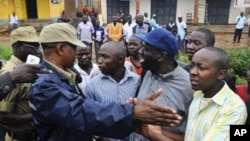The freedoms of speech and peaceful assembly are fundamental human rights and critical components of a democracy. The ability of citizens to discuss and debate, to meet together and to protest injustice, allows issues to be better understood and areas of compromise to be found, laying groundwork for the consensus needed in popular rule.
The government of Uganda's action in recent weeks to stifle protest against rising costs for fuel and other goods threatens these freedoms. The United States is deeply concerned about the political crackdown and harassment of opposition leaders in Uganda. We call on the Ugandan government to respect the rights of civil society to engage in non-violent demonstrations.
Demonstrations began in the spring with a series of marches by Ugandans protesting economic conditions. To press their point, demonstrators said they would rather walk to work than drive their cars because of high fuel prices. Hundreds were charged with inciting violence and rioting, but the courts threw out the charges. Protest leader Kizza Besigye, a three-time presidential candidate, was repeatedly arrested and released before earlier demonstrations subsided.
The situation heated up again last month with renewed walk-to-work protests. Six individuals have been charged with treason – a capital offense – for allegedly planning to overthrow the government through demonstrations. Besigye was confined to house arrest until a Ugandan court found it illegal, but he is now subject to short periods of detention without charges being filed.
U.S. officials have met with Ugandan government leaders to express concern over these actions and will continue to do so.
Stifling Free Speech In Uganda

The freedoms of speech and peaceful assembly are fundamental human rights and critical components of a democracy.



